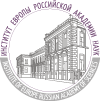Analytical papers IE RAS 2021
Sergey Roginko “‘Food racism’ in the EU: the problem persists?” Analytical papers № 7, 2021 (№237)
The paper explores the problem of double standards of quality of the goods produced in the EU by multinational companies for Western and Eastern Europe. Reality of the problem is demonstrated by the studies conducted in individual EU countries, revealing the difference in quality of the products sold in Eastern and Western Europe. The political resonance of this issue and effects of the measures by the European Commission to solve it are evaluated. The research takes into account the factors of COVID-19, reduced mobility and digitalization of trade.
Vladislav Belov “Party and political situation in Germany after a year of coronavirus pandemic.” Analytical papers № 6, 2021 (№ 236)
In March 2021, a year after the start of decisive anti-coronavirus actions of the German state at federal and regional levels, Germany found itself in the center of the third pandemic wave. Unlike spring 2020, the government was unable to provide adequate responses to the new challenges, lowering the popularity of CDU / CSU union, the backbone party leader of Germany, and questioning the effectiveness of interaction mechanisms between the lands and federation.
Elena Ananieva, Kira Godovanyuk “UK National Security Strategy.” Analytical papers № 5, 2021 (№235)
The new UK national security strategy review (March 2021) has an integrated character, for the first time uniting the spheres of defence, security, development and foreign policy in one concept. This paper explores the evolution of the Johnson government approaches to the content of the strategy in the context of post-Brexit and its implications on UK-Russia bilateral relations.
Vladislav Belov “Land elections in Rhineland-Palatinate and Baden-Württemberg as indicators of party and political trends in Germany.” Analytical papers № 4, 2021 (№ 234)
On March 14, 2021, elections in the Landtags of Rhineland-Palatinate and BadenWürttemberg were held. They were the first in the election marathon in Germany this year. Their results reveal the current electoral attitudes six months prior to the parliamentarian election to Bundestag, as well as the scenarios of governing coalitions, which may emerge in September. The paper analyzes the Landtags election results in the context of their significance for party and political processes in the Federal Republic of Germany.
Vladimir Vernikov “Elections in Catalonia – a test for the government in Madrid.” Analytical papers № 3, 2021 (№ 233)
This paper is dedicated to the parliamentary elections that took place on February 14, 2021, in Catalonia, an autonomous region that has been seeking independence from Spain for many years. The largest number of mandates (33 each) in the regional parliament were received by the Catalan Socialists (PSC) and the Republican Left (ERC) – proponents of independence. 32 mandates were obtained by another separatist party «Together for Catalonia» (JpC), formally led by the former head of government K. Puigdemont, who is hiding from Spanish justice. Arithmetically, none of the parties of the trio is capable of independently forming the region’s government – Generalitat. It is difficult to forecast how the parties will interact to obtain the majority and vote of confidence: their internal contradictions and differences in visions of the region’s future are too significant.
Nikolay Mezhevich, Petr Oskolkov “Government crisis in Estonia: possible reasons and outcomes.” Analytical papers № 2, 2021 (№ 232)
This analytical paper is focused on the socio-economic and political context of the government change in Estonia in January 2021, as well as its structural preconditions and possible consequences for internal and external policies. The authors suggest that, along with the official reason, i.e. corruption scandal, the intent to get rid of the right-wing populist Estonian Conservative People’s Party might have been an important rationale for breaking up the old ruling coalition and making up a new one in a very short period of time. The new coalition allowed the Center Party to retain its key positions, while obtaining support from a more reliable and predictable partner, the Reform Party. This may have important consequences for the internal political consensus and foreign political strategy.
Vladislav Belov “The new CDU chairman election.” Analytical papers № 1, 2021 (№ 231)
On January 16, 2021, online congress of the CDU elected a new party chairman – the Prime Minister of North Rhine-Westphalia, Armin Lachette, who replaced Annegret Kramp Karrenbauer. In contrast to most predictions, Armin Lachette won against the favorite Friedrich Merz. The author analyzes the significance of the event for CDU, assesses the party's prospects for the year of superelections in Germany, and predicts the development of Russian-German relations.


